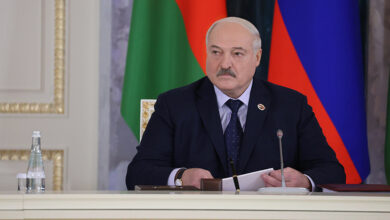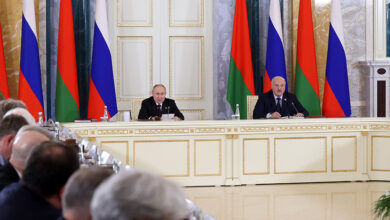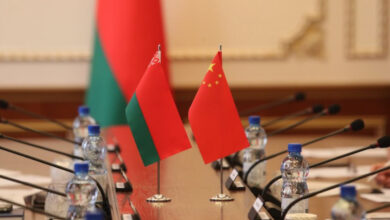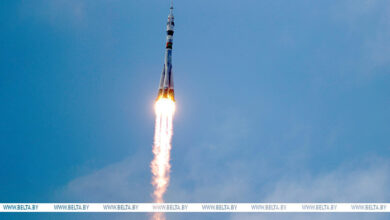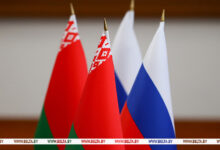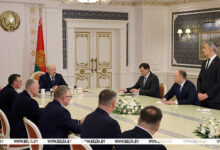Results of Lukashenko’s visits to China, UAE, Equatorial Guinea, Kenya in President’s Week

The work schedule of the Belarus president is always full of events. Aleksandr Lukashenko holds conferences and working meetings on the most topical matters concerning the country’s development, regularly visits the regions, goes on foreign trips and welcomes foreign guests, talks to reporters, signs decrees and laws. And even if there are no public events, it does not mean that the head of state does not work. It must be said that even when he relaxes, for instance, by playing ice hockey or chopping firewood, Aleksandr Lukashenko happens to find the time to give yet another instruction. All the decisions must be prompted by life, he likes to say.
The President’s Week project is intended for those, who want to keep up with the head of state, be up-to-date on the latest statements and decisions of the Belarusian leader.
Why is speed crucial to Belarus-China cooperation now? For what initiative should the world be grateful to China? Against whom did Aleksandr Lukashenko play ice hockey in Beijing? Highlights of four hours of talks between the Belarus president and China President Xi Jinping.
What did Aleksandr Lukashenko discuss with the UAE president? How were notes about the realization of joint projects compared?
Why does Belarus want to trade with Africa? How do Belarus’ approaches differ from practices of former colonizers? Will Belarusian potatoes grow on the equator? Where will Belarusian specialists start digging the ground together with African colleagues? Results of Aleksandr Lukashenko’s visits to Equatorial Guinea and Kenya.
All the key details of international meetings and negotiations of the Belarusian leader in a new episode of BelTA’s special project President’s Week.
COMMUNITY OF COMMON DESTINY. About what did Aleksandr Lukashenko talk to Xi Jinping?
The work week of the Belarusian head of state began with negotiations with China President Xi Jinping in Beijing on 4 December. Aleksandr Lukashenko had arrived in the Chinese capital city the day before.
The conversation began in an informal and friendly manner. This format of communication very rarely occurs as part of the international protocol and this fact speaks volumes.
The China president asked his Belarusian counterpart whether the latter had had time to rest. “You landed rather late yesterday,” he remarked.

“Yes. I had been flying for eight hours,” Aleksandr Lukashenko said. “I always rest well in China. At least calmly.”
“You can always sleep calmly in China,” Xi Jinping said in response.
In response Aleksandr Lukashenko remarked that when debates about China are going in the West, when they start criticizing China for something, then he always tells them that they should be thankful to China for the fact that 1.5 billion people live a calm and normal life. “It means a lot in this day and age, as they say,” he noted.
Aleksandr Lukashenko and Xi Jinping spoke for a total of about four hours. After the negotiations they continued talking during a working lunch.

A meeting at the level of deputy prime ministers also took place in Beijing that day. Aleksandr Lukashenko suggested organizing it as he was talking to Xi Jinping. The hosts readily agreed to the idea. The agreements reached by the leaders were further developed and solidified. First Deputy Prime Minister of Belarus Nikolai Snopkov and Deputy Prime Minister of the State Council of the People’s Republic of China Liu Guozhong took part in the meeting.

Friends that need no convincing
Aleksandr Lukashenko stressed that Belarus has been building friendly relations and partnership with China persistently for decades. “Belarus has been, is, and will be a reliable partner for China. I don’t think anyone in China needs to be convinced of this. All this has happened before my eyes for the last 30 years and even more than that. I came to China for the first time as a member of parliament,” the Belarusian leader noted.
In his words, the development of comprehensive and all-weather strategic cooperation between Belarus and China is determined by the similarity of the ideologies and the very logic of international events and processes that are taking place today. The historical upgrade of the level of relations gave a powerful boost to the advancement of traditional cooperation avenues, to the start of new vectors and mechanisms of Belarus-China cooperation.
“Our meeting on 1 March [2023] was in many ways pivotal and set the momentum for the whole year. Since March more than 120 mutual visits have been carried out. Those are various visits. What is most pleasing is that the visits are related to cooperation in the manufacturing sector, trade and economy,” Aleksandr Lukashenko remarked.
He also remarked he has known Xi Jinping for many years and has worked with him to advance the bilateral relations. “We have a lot of experience. We know what our countries need. And we have done a lot in this regard,” the Belarus president stressed. “We decided a long time ago that we would cooperate and live in friendship with China. As I’ve already said, this friendship is more than 30 years old. We have never turned from this path either to the left or to the right.”
The only and key matter

There are always plenty of topics for discussion, including in Belarus-China relations. And it is logical: the larger the volume of cooperation is and the more cooperation avenues there are, the larger the number of issues that national leaders have to address from time to time.
But in his introductory speech during the negotiations Aleksandr Lukashenko mentioned the key thing: “When I was preparing for this visit, I questioned my colleagues [in the Belarusian government] about what needs to be done, what things are not moving forward so that I could discuss these things in Beijing. We did not find a single issue without progress. The only issue that I would like to discuss with you today is speed.”
“Time is so compressed and fortunately or unfortunately we cannot influence this time compression. We sometimes lag behind and fail to take steps in time. Not only China and Belarus do. It happens everywhere in the world. And those, who reach their goals first, will reign supreme,” Aleksandr Lukashenko added.
Interest of Belarus and of the entire planet
During the negotiations the Belarus president also noted he supports the concept of building the community of common destiny, which had been previously put forward by the Chinese leader.

“You’ve just mentioned the Belt and Road. I came to the conclusion a long time ago that the Belt and Road Initiative is, as you’ve said, no longer a concept today. It is already a practice that is being implemented. No one can argue with this today, and no one can find even a trifle to criticize. The most important thing is that you have defined the common destiny for mankind as the goal. Unlike Western countries that are trying to tear everything apart, you have set the single goal for all. Who can argue with that? No one. The world will be grateful to Great China for this,” the head of state said.
“We are very interested in seeing China as a powerful country. We would like to see it grow. This is not only our interest. It is the interest of the whole planet, because a huge number of talented hardworking people live here [in China],” Aleksandr Lukashenko stressed.
Strategic interaction between China and Belarus

In turn, China President Xi Jinping stated that together with Belarusian partners China is ready to strengthen strategic cooperation in the name of building a community with a shared future for mankind.
“My great friend, I am very glad to see you again. As part of your state visit to China in late February and early March of this year, we reached important agreements in favor of the dynamic development of Chinese-Belarusian relations. At every stage we reach new agreements. Over the course of the year political mutual trust and international cooperation are strengthened. New results have been achieved in cooperation within the framework of the Belt and Road Initiative,” the Chinese leader said.
The China president stated that the Belt and Road initiative was just a concept ten years ago. Now more than 140 countries and international organizations have joined cooperation within the framework of this initiative.
Xi Jinping stressed that under the strong leadership of its president Belarus had managed to overcome the impact of various negative factors, to preserve social harmony and stability, to ensure economic recovery and growth, which has laid a solid foundation for further development.

“Maintaining stability and long-term development is very important for China. We have made great accomplishments in this work,” the Chinese leader noted.
During the meeting it was stated that the People’s Republic of China firmly supports Belarus’ way of development, which corresponds to the country’s national particularities, and speaks against the interference of external forces in the country’s policy.
China and Belarus are important forces involved in the transformation and construction of the global governance system. “China is ready to work with Belarus to strengthen coordination and cooperation within multilateral mechanisms such as the United Nations Organization and the Shanghai Cooperation Organization,” the Chinese leader said.
China is ready to implement initiatives together with Belarus for the benefit of common development, security, for the sake of strengthening civilizational values. Xi Jinping also pointed out the need to optimize cross-border transportation, strengthen trade, economic and humanitarian cooperation.
In addition, the Chinese leader invited his Belarusian counterpart to expand cooperation between the two countries in culture, education, healthcare, sport, and tourism. He also pointed out the importance of promoting youth exchanges and strengthening mutual understanding and friendship between the two peoples.
Visit to Peking University and an ice hockey match

As part of the working visit to China Aleksandr Lukashenko also visited Peking University. He met with Hao Ping, Secretary of the CPC Peking University Committee, Chair of the Peking University Council, Deputy Chairman of the Foreign Affairs Committee of the National People’s Congress at Peking University.
Aleksandr Lukashenko noted he had just had a meeting with the China president. He also mentioned consequent efforts to convert the agreements that had been reached into practice. “All our great ambitions and agreements should be grounded. They should be converted into specific projects. On the instructions of Xi Jinping and on my instructions, the vice premiers are doing exactly this,” he said.
The president also mentioned the need to intensify communication between the two peoples. “The Chinese president placed a special emphasis on this today. We need more intensive communication among the youth, between youth groups, between young people in general because they are the future.”
According to Aleksandr Lukashenko, student exchanges were also discussed at the meeting with Xi Jinping. “We need to scale up student exchange programs. We need to expand cooperation beyond biotechnologies into chemistry, physics, mathematics… China is interested in this kind of cooperation,” the president noted.
Hao Ping recalled that he was part of the Chinese delegation during the state visit of the Chinese president to Belarus in 2015. He was a deputy education minister back then. He cherishes the memories of the hospitality and the warm welcome that he felt in Minsk.

“You recalled the prehistory of our relations. One of the pages is connected with you. This is very gratifying. You know Minsk. You have been to Minsk. It means that it will be easier for us to intensify our contacts in education,” the Belarusian leader remarked.
In turn, Aleksandr Lukashenko said that earlier that day Xi Jinping had recalled their first meeting in Minsk. “He was deputy president back then. I was very pleased to find out that he remembers even small details of our meeting,” the president said.
Aleksandr Lukashenko also took part in a warm-up and a friendly match of the Peking University hockey team. Hao Ping said: “Many of our young students, who play ice hockey, didn’t sleep last night. They were agitated. Our university has hosted over 70 heads of state and heads of government. But it is probably the first time a foreign head of state will play ice hockey with our students.”
The head of state took to the ice to a well-known Belarusian song performed by the Belarusian band Pesniary.
Peking University is a key higher education institution in China. It is one of the country’s two most prestigious universities, the other one being Tsinghua University. The Belarus president made a speech before students of Peking University in September 2016. The university signed an agreement with Belarusian State University in May 2022 on launching a joint educational program in biotechnology.


COMPARISON OF NOTES. How did the top-level meeting in the United Arab Emirates go?
Negotiations of Belarus President Aleksandr Lukashenko and President of the United Arab Emirates, Sheikh Mohamed bin Zayed Al Nahyan took place in the personal residence of the UAE president on 8 December.
During the meeting Aleksandr Lukashenko and Mohamed bin Zayed Al Nahyan discussed items on the saturated bilateral agenda.
During the previous meeting in February the heads of state agreed to take cooperation in a number of areas to the next level. Belarus and the United Arab Emirates launched important projects. The two heads of state compared notes regarding the realization of these projects today.
The United Arab Emirates is Belarus’ main trading partner among Arab states of the Persian Gulf. Trade turnover between the two countries rises systemically and has been showing impressive dynamics and results recently. The United Arab Emirates was the third top investor in the Belarusian economy last year. A high level of political dialogue has been established between the countries. The intensity of contacts at the high level and the top level also confirms it.

This meeting of the heads of state took place in the personal residence of the president of the United Arab Emirates. The negotiations lasted for about two hours. In “a homelike, family format” according to the host country.
Aleksandr Lukashenko thanked his UAE counterpart for the warm welcome and the attentive attitude towards the Belarusian delegation.
BelTA reported earlier that the Belarusian head of state took part 28th conference of the parties to the United Nations Framework Convention on Climate Change (aka the world climate summit aka COP28) in Dubai in early December. He held a number of international meetings on the sidelines of the summit.
LET’S START DIGGING. Highlights of Aleksandr Lukashenko’s visit to Equatorial Guinea
The African vector in Belarus’ international contacts has been increasingly visible recently. The close attention leaders of countries of this continent pay to the Belarus president is one of the indicators. It was possible to see it in footage from the summit in Dubai.
This is why news about Aleksandr Lukashenko’s yet another trip to African countries is no longer viewed as something extraordinary. These trips continue systemic work aimed at establishing strong ties between Belarus and countries in this region, at finding strategic partners.
Equatorial Guinea is small in size. It is located in Central Africa on the coast of the Atlantic Ocean. Yet it is very important and respected in the region. Partially thanks to respectable deposits of hydrocarbons, which were discovered in the late 20th century, and largely thanks to the policy of its president Teodoro Obiang Nguema Mbasogo. This is why the success story in Equatorial Guinea can become an example and a showcase of what Belarus is capable of accomplishing in cooperation with other African countries.
The Equatorial Guinea president came to Minsk on a visit in September 2023. Work at the government level was invigorated after that. Ahead of Aleksandr Lukashenko’s official visit to Malabo the parties had put together a roadmap to guide the advancement of cooperation for the next three years. The roadmap lists tens of specific cooperation avenues and projects. Within several months Belarus and Equatorial Guinea managed to achieve so much that other countries sometimes need years to do the same.
Colorful welcome at the airport and the president’s impressions




Equatorial Guinea Vice President Teodoro Obiang Nguema Mangu welcomed the Belarusian head of state at the airport in the afternoon on 9 December. Not only government officials but multiple local residents, performance groups had been waiting for the Belarusian leader. Traditional songs and rousing African dances – the host country did everything to add not only equatorial warmth to Aleksandr Lukashenko’s meeting but the atmosphere of sincere friendship and hospitality.
During negotiations with Equatorial Guinea President Teodoro Obiang Nguema Mbasogo later on Aleksandr Lukashenko spoke very warmly about the country. He noted that it was his first visit to Central Africa and he was impressed with what he had seen in this part of the beautiful African continent. “Beautiful forests, rivers, the Atlantic Ocean with rich fish reserves. These are truly heavenly treasures. And I told the president that you live in paradise. But the greatest treasure of any country is its people. It is equally applicable both to Belarus and to Equatorial Guinea. Kind, hardworking people, who genuinely wish to take care of their native land, people, who are open to new knowledge, experience, people, who truly feel their friends and like-minded persons,” Aleksandr Lukashenko said.
The Belarusian head of state said he sees big potential for the development of Equatorial Guinea: “You are indeed a small country but with huge opportunities. Some of the places I’ve seen here are simply stunning in their beauty. I thought it would be difficult even for us to build things like these.”

An impressive leap
The Belarusian leader stated: “Within the last six months we’ve secured an impressive leap. We’ve exchanged visits at the top level, created a joint permanent commission on cooperation, held the commission’s first session, and substantially invigorated business activity.”

He mentioned the ambitious goals the Equatorial Guinea president set out to accomplish in order to increase the prosperity of the nation. And Belarus is ready to help Equatorial Guinea the same way it did in cooperation with another African country – Zimbabwe. That country couldn’t feed its own people. But today it exports grain as the Zimbabwe president says. We’ve solved this problem together within only two years,” Aleksandr Lukashenko quoted an example.
Equatorial Guinea actively speaks in favor of reinforcing African unity, in favor of reforming the UN Security Council to reflect Africa’s role in the international arena, in favor of advancing political and economic cooperation in Central Africa.
“It is a great honor to have such a friend. Belarus is a reliable partner for Equatorial Guinea. We bolster our friendship not only with words but with deeds,” the Belarusian leader stressed.

By the way, a Belarusian embassy will soon start working in Malabo. An embassy of Equatorial Guinea is expected to open in Belarus by the end of 2024.
Comprehensive solutions for development of Equatorial Guinea
Aleksandr Lukashenko confirmed the readiness to provide comprehensive solutions for the sake of development of Equatorial Guinea. The president assured: “Belarus has experience of mechanization and industrialization of agriculture. Our machines, equipment, technologies are simple and reliable. I am convinced that our trucks, buses, road construction machines, municipal vehicles, fire trucks, mining vehicles, timber harvesters will be in demand.”
Aleksandr Lukashenko mentioned the rapid advancement of cooperation in healthcare. Assistance was mentioned with managing hospital complexes, organization of primary medical aid for the population, personnel training, shipments of pharmaceutical substances and medical equipment. Belarus offered grants to Equatorial Guinea students for going to medical education institutions in Belarus’ territory.
Aleksandr Lukashenko also mentioned the need to actively use opportunities in the humanitarian sphere – education, science, sport, tourism, and culture – in order to bring the two nations even closer to each other.
In turn, Belarus is interested in importing Equatorial Guinea cocoa, tropical vegetables and fruits, in the joint processing of fish products.
“Belarus is ready to become a bridge to Eurasia for your country. We count on reciprocal support within the framework of the African Union and other integration associations. I am convinced it will contribute to the growth of business activity,” Aleksandr Lukashenko said.
In his words, the joint work of business circles and national chambers of commerce and industry should become the key link in the process of establishment and formation of new steady business ties.
The key approach to cooperation
During these negotiations and at other times Aleksandr Lukashenko emphasized the key point several times: Belarus’ role in Equatorial Guinea and the format of cooperation. The Belarusian head of state said: “Certainly, we didn’t come into your country to offer charity. We cannot do it and we do not have to do it. But we are not going to profiteer at the expense of your people, your country either. We are no colonizers. We are your friends. As we share technologies in many areas where you need them, we will train your people how to use these technologies. We will not send our workers to you. We will send a sufficient number of specialists in agriculture, manufacturing sector, healthcare, education… While your people will do the work. And our task is to teach your people.”
Aleksandr Lukashenko stressed that Belarusians have come to Equatorial Guinea as friends. He suggested doing everything necessary in order to expand cooperation onto other countries of the region. “I would very much like for you and us to do everything so that we could bring the technologies we will introduce here, in Equatorial Guinea to other countries of the African continent. We have to help the countries that desire prosperity for their nations and development for their states. I think it’s within our power to realize,” he said.
After the negotiations the head of state once again underlined: “I want the people of Equatorial Guinea and peoples in Africa to learn that we are not coming here in order to profiteer here and now. We would like to cooperate with you on a mutually beneficial basis. We don’t want to offer charity. That would only be harmful to our nations. We will cooperate in the name of our nations.”
Aleksandr Lukashenko stressed that right now Equatorial Guinea does not need some high technologies. For instance, this country does not need to launch spacecraft into outer space. The realization of more down-to-earth but extremely necessary projects is the idea. And Belarus has the necessary technologies to advance Equatorial Guinea to another level or two.
“The country should not spend foreign currency on buying the products and goods Equatorial Guinea can make. It is an axiom,” the Belarusian leader said.

A roadmap and over 70 projects
After the negotiations in Malabo were over, the presidents Aleksandr Lukashenko and Teodoro Obiang Nguema Mbasogo signed a roadmap to guide the advancement of cooperation between Belarus and Equatorial Guinea. The roadmap was put together taking into account Equatorial Guinea’s needs. It is a comprehensive document. It covers 15 key cooperation avenues, including manufacturing cooperation projects, deliveries of Belarusian machines, vehicles, and equipment, organization of maintenance of Belarusian machines and vehicles in addition to agriculture, healthcare, pharmaceutics, sales of medical equipment, forestry industry. The roadmap covers the period from 2024 through 2026.
A package of about 15 documents meant to advance cooperation in various spheres was also signed in the presence of the heads of state.

“As a result of the visit and negotiations without an exaggeration we started a new stage of Belarus-Equatorial Guinea relations. Within only a year we’ve done the work many countries take decades to accomplish. This fact very clearly indicates mutual interest and eagerness to advance the partnership to a brand new level,” Aleksandr Lukashenko stated.
The promising projects include the construction of an agrotown with the necessary infrastructure, the construction of 100 welfare residential buildings, the creation of a factory able to make up to 40 million ceramic bricks per annum; sales of fire trucks, construction machines and other vehicles and machines, including for the sake of implementing a joint project for timber harvesting and the creation of new farmlands, efforts to expand the power grid onto remote areas. “Not to mention healthcare, education, and so on,” the head of state remarked.
Agreements were also reached on farming individual kinds of agricultural crops, on opening agrochemical labs, and other things.
Aleksandr Lukashenko stated: “I would like to note specifically that agreements were reached on realizing the first stage of creation of a regional hub for promoting Belarusian goods onto markets of the countries in Central and Western Africa.”
“We’ve decided to begin active work right now: without taking it slowly and without bureaucratic foot-dragging. All the emerging issues will be promptly resolved. With assistance of the heads of state if need be. The governments have been instructed to take the necessary financial, legal and organizational measures as fast as possible,” the Belarusian head of state said.
The president stated that the documents the parties had signed are generic but 74 concrete projects had already been agreed in furtherance of these documents. “It is a feat accomplished by members of the governments of Equatorial Guinea and Belarus, by our specialists. The 74 concrete projects that we have to realize within the next 2-3 years. We will start digging the ground and tackling problems in Equatorial Guinea tomorrow,” the president concluded.

Equatorial Guinea’s independence and what it can learn from Belarus
In his speech after the negotiations Teodoro Obiang Nguema Mbasogo mentioned a large number of agreements that had been signed and the seriousness of Belarus’ intentions to realize the agreements. “I have already told my friend what we are fighting for right now – for economic independence. We gained political independence but economy continues to remain a limiting factor. There are countries that don’t want Africa to develop. Countries that bring instability, that invent all kinds of changes in order to exploit our resources. But Africans are waking up. We already see that we have been deceived. We are disappointed. And where we had hope, we will be unable to get anything from our former colonizers,” he said.
The Equatorial Guinea president is convinced that this is why it is necessary to change spheres of interaction in this new process, including by seriously working with Belarus among other countries. “It is a disciplined nation. It is a nation that honors its promises,” he stressed.
He called upon his own country’s nation to act in the same manner: “We have to fulfill what our country receives. Our mentality is part of the brake of our development. This is why I urge my compatriots to engage in this cooperation with great discipline. We have to understand and learn from our friendly country.”
Teodoro Obiang Nguema Mbasogo mentioned the resolve to give an impulse to the creation of an alliance between Belarus and Equatorial Guinea with a view to ensuring sustainable development and jointly counteracting global challenges. “I am convinced that our alliance of Belarus and Equatorial Guinea will advance in order to honor our commitments within the framework of the 2030 agenda. For us Belarus is a priority in our foreign policy,” the president stressed.
He bestowed an Order of Independence upon Aleksandr Lukashenko. This order is one of the highest government awards in Equatorial Guinea.

As he accepted the order, the Belarus president stated: “There is no way out. Equatorial Guinea must be independent!”
Africa’s future
After the official negotiations and after the document signing ceremony Equatorial Guinea President Teodoro Obiang Nguema Mbasogo held an official reception in honor of Belarus President Aleksandr Lukashenko.
“The world is changing. It will never be the same. There will never be a return to the way it was. The nations of the world realize this. Most of them have realized that Africa is the future. Africa’s time has come. Frankly speaking, it will be very difficult for countries like Equatorial Guinea and Belarus to stand alone in this turbulent world. In order not just to withstand, but to occupy our place in this rapidly changing world, in order not to perish, we must stay close to each other. Only together, walking shoulder to shoulder, hand in hand, we will be able to persevere in this world,” the Belarusian leader said.
He noted that many of the fifty African states have gained political freedom, but it is not even half of the road. “Almost half of the world’s natural resources are accumulated in Africa. This half of the world’s natural resources must benefit the people of the African continent. This is the essence of economic freedom, which you have to achieve,” Aleksandr Lukashenko said.
He assured that Belarus would be a reliable friend of Equatorial Guinea and its people along this way.
“Let us do everything to implement these projects within three years [the cooperation roadmap is designed for 2024-2026]. We have everything to realize our plans. But most importantly, we have the desire and the people who are committed to the future and are ready to make these plans a reality,” the Belarusian head of state is convinced.
A new capital city and a meeting on the continent
On the second day of his official visit Belarus President Aleksandr Lukashenko travelled from the capital city of Malabo in the island part of the country to the mainland of Equatorial Guinea. The aircraft of the Belarusian head of state landed at the airport of Mengomeyen. Aleksandr Lukashenko was welcomed by President Teodoro Obiang Nguema Mbasogo at the airport. He invited the Belarusian leader to see the new capital of Equatorial Guinea, Ciudad de la Paz, which name is translated from Spanish as the City of Peace.
The presidents decided to travel around the future capital in one car. During the drive through the future capital, the president of Equatorial Guinea showed the Belarusian head of state the Afro-American University of Central Africa, the La Paz Oyala Hospital, and the Government House.
The city is located in the east of the country’s continental part. Formerly known as Oyala, the city was renamed into Ciudad de la Paz (city of peace) in 2020. The Equatorial Guinea president is behind the initiative of relocating the capital city. The new capital city is expected to combine new architectural trends and traditional cultural elements while promoting the city’s identity. Renewable sources of energy are expected to play a large role in the city infrastructure.

The leaders continued their talks over an informal lunch. Despite the less official format Aleksandr Lukashenko and Teodoro Obiang Nguema Mbasogo continued a serious conversation about the advancement of bilateral cooperation.
The Belarusian head of state also spoke to the First Lady of Equatorial Guinea Constancia Mangue de Obiang, who had already visited Belarus, and who oversees the medical sector in her country.

In conclusion of the visit the Equatorial Guinea president saw off Aleksandr Lukashenko to the aircraft.
JOINT FUTURE. What did Aleksandr Lukashenko offer to the Kenyan president in Nairobi?
After leaving Equatorial Guinea the aircraft of the Belarusian leader went towards Kenya’s capital Nairobi in the evening on 10 December. The leaders of Belarus and Kenya agreed to meet back in early December on the sidelines of the climate action summit in Dubai.

At the airport the Belarusian head of state was welcomed by Kenyan Minister of Agriculture and Livestock Development Mithika Linturi. By the way, the official together with the trade, investment, and industry minister of Kenya came to Belarus in June. During meetings with relevant government agencies and the Ministry of Foreign Affairs back then the parties discussed cooperation in agriculture, including the mechanization and industrialization of processes, deliveries of machines, vehicles, fertilizers, and personnel training.
Kenyan President William Ruto warmly greeted Aleksandr Lukashenko. “We are very glad that you found the time to visit us. I understand that the visit will be brief, but nevertheless it is no less cordial on our part. This is not an official visit. Nevertheless, it gives us the opportunity to plan an official visit. We are very glad that you have found the time to visit us and be with us today,” he said.

The Kenyan leader recalled that during the meeting at the global climate summit in Dubai the heads of state agreed on the need to intensify contacts between Belarus and Kenya. “We agreed that we will jointly look at our opportunities and areas where we could cooperate and build relations on the basis that we have created between our two countries,” William Ruto said.
Aleksandr Lukashenko suggested working out a roadmap to advance cooperation with Kenya. “We agreed in Dubai that we would meet and discuss our first steps to establish trade, economic and closer political relations,” the Belarusian leader said at the beginning of the meeting.

In his words, it is now necessary to determine avenues of future cooperation and come up with some concrete plan for these avenues. “If we want to cooperate, then I am sure that we will be able to develop such a plan, a roadmap, as we have done with other countries of the African continent,” the Belarus president said.
“Mr. President, you have to know that if we come to an agreement, we will quickly go this way. Because your country holds a very important strategic position in Africa. You determine the policy of the African continent to a large degree. The president of Equatorial Guinea told me about this,” Aleksandr Lukashenko remarked.
Taking into account the fact that a decision was made at the highest level to intensify bilateral relations, the head of state suggested that groups of specialists from Belarus and Kenya exchange visits, get to know the countries better to prepare a concrete action plan for the development of cooperation.
Aleksandr Lukashenko also invited his Kenyan counterpart to visit Belarus. “I will be glad to see you at any time. I hope that you will find time to visit Minsk in the first half of next year,” he said.

In Nairobi the Belarus president made an entry in the distinguished visitors’ book: “Minsk is interested in strengthening cooperation with Nairobi in a wide range of areas, primarily in trade and investment. I am confident that our countries have a great joint future. I wish the president of Kenya happiness and health, and also prosperity and wellbeing to the friendly Kenyan people.”
Aleksandr Lukashenko added a phrase in Belarusian at the end: “Thank you very much and see you soon!”
At the end of the one-on-one meeting the president of Kenya invited his Belarusian counterpart to dinner.


